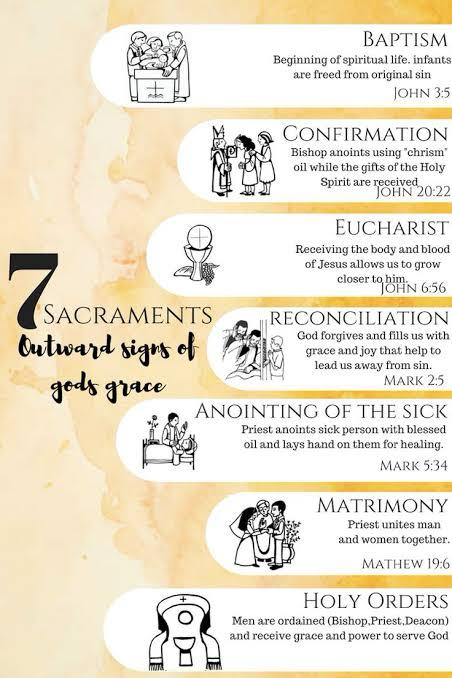The Seven Sacrament
Introduction
The sacraments are essential rites and ceremonies in the Catholic Church, seen as channels of grace instituted by Jesus Christ. They are visible signs of invisible grace, performing a crucial role in the spiritual life of Catholics. The Catholic Church recognizes seven sacraments, each serving distinct spiritual purposes and stages in a Christian’s life.
The Seven Sacraments
- Baptism
- Significance: Baptism is the first sacrament of initiation, symbolizing the washing away of original sin and rebirth in Christ. It marks the entry into the Christian community.
- Rite: Typically involves the pouring of water over the head or full immersion, accompanied by the words, “I baptize you in the name of the Father, and of the Son, and of the Holy Spirit.”
- Effects: Cleanses from original sin, grants sanctifying grace, and initiates the individual into the Church.
2. Eucharist (Holy Communion)
- Significance: The Eucharist is central to Catholic worship, commemorating the Last Supper where Jesus offered bread and wine as his body and blood. It is seen as the source and summit of Christian life.
- Rite: During Mass, bread and wine are consecrated by a priest and received by the faithful, believing in the real presence of Christ.
- Effects: Strengthens the union with Christ, forgives venial sins, and helps avoid future sins.
3. Confirmation
- Significance: Confirmation is the second sacrament of initiation, bestowing the gifts of the Holy Spirit to strengthen and mature the faith of the believer.
- Rite: Typically involves the anointing with chrism (holy oil) on the forehead by a bishop, with the words, “Be sealed with the gift of the Holy Spirit.”
- Effects: Deepens baptismal grace, unites more firmly with Christ, increases the gifts of the Holy Spirit.
4. Reconciliation (Confession or Penance)
- Significance: Reconciliation is the sacrament of healing, providing forgiveness for sins committed after baptism and reconciliation with God and the Church.
- Rite: Involves confession of sins to a priest, receiving a penance, and absolution through the prayer of absolution.
- Effects: Restores grace, reconciles with God and the Church, and provides spiritual strength to resist sin.
5. Anointing of the Sick
- Significance: This sacrament offers spiritual and sometimes physical healing, giving grace to those who are seriously ill or near death.
- Rite: Includes prayers, the laying on of hands, and anointing with oil on the forehead and hands.
- Effects: Provides comfort, peace, courage, and sometimes physical healing, forgives sins if the sick person is unable to confess.
6. Holy Orders
- Significance: Holy Orders is the sacrament through which the mission given by Christ to his apostles continues in the Church, bestowing spiritual power and grace to serve the faithful.
- Rite: Involves the laying on of hands and a prayer of consecration, ordaining a man as a deacon, priest, or bishop.
- Effects: Confers a permanent spiritual character, grants the grace to perform sacred duties, and fosters the pastoral care of the community.
7. Matrimony (Marriage)
- Significance: Matrimony unites a man and a woman in a lifelong covenant of love and partnership, reflecting Christ’s union with the Church.
- Rite: The couple expresses mutual consent to marry, often in the presence of a priest and witnesses, with the exchange of vows and rings.
- Effects: Strengthens the couple’s bond, sanctifies their love, and grants the grace to raise a Christian family.

Theological Basis
The sacraments are rooted in the life and teachings of Jesus Christ. They are seen as instituted by Christ and entrusted to the Church to dispense divine grace. The sacraments are signs of grace, instituted by Christ and entrusted to the Church, by which divine life is dispensed to us. Each sacrament has biblical foundations and historical developments, and they collectively shape the spiritual life of Catholics. You can also read more about The Seven Sacrament of the Catholic Church
Importance in the Life of Catholics
The sacraments mark important spiritual milestones and provide the necessary grace to live a Christian life. They are integral to worship and community life within the Catholic Church, fostering a deeper relationship with God and with one another. Through the sacraments, Catholics believe they receive the necessary spiritual strength to live out their faith authentically and fully.
- Baptism and Confirmation initiate and strengthen one’s faith journey.
- Eucharist sustains and nourishes the soul.
- Reconciliation and Anointing of the Sick provide healing and restoration.
- Holy Orders and Matrimony structure the Church and community life.
Conclusion
The sacraments are central to the Catholic faith, acting as conduits of divine grace and essential rites of passage. They encompass the entirety of a Christian’s life, from birth to death, enabling believers to experience and live out their faith in tangible and transformative ways. Each sacrament is a profound encounter with the sacred, grounding Catholics in the mysteries of Christ’s life and love. You can also click here to read and know more about post that is related to catholic doctrine




Leave a Reply to Eucharist | catholic insight Cancel reply